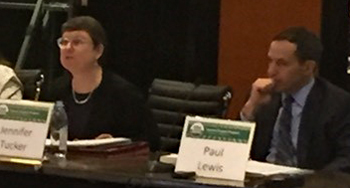Offered No Further Clarity at the Spring 2019 NOSB Meeting
At the recent spring National Organic Standards Board (NOSB) meeting in Seattle, Washington, organic stakeholders shared their incredulity and frustration regarding disturbing statements made by National Organic Program (NOP) Deputy Administrator Jennifer Tucker, brought to light in April by the Real Organic Project, about the use of prohibited substances in “organic” hydroponic production.
 |
at the spring NOSB meeting |
Tucker, along with other NOP officials and staff, faced multiple questions about the use of glyphosate by hydroponic operations during public comments to the NOSB. Emotions ran high on all sides as Tucker claimed her prior statements were taken out of context.
According to Tucker, her previous statement indicating that a hydroponic operation could spray glyphosate or other pesticides on the land just prior to erecting a greenhouse and be immediately certified organic was not a statement of NOP policy. Instead, Tucker contended her comment was made in response to a hypothetical scenario.
“These questions—including whether the three-year transition period applies to all organic operations—are not hypotheticals,” said Kestrel Burcham, an attorney and Cornucopia’s Director of Domestic Policy, “They are essential questions of the application of law.”
NOP officials were asked directly by both public commenters and concerned NOSB members to clarify and confirm that no operation seeking organic certification can use prohibited materials, including glyphosate, during their required three-year transition period. They refused to do so.
Tucker defaulted to repeating the mantra that “glyphosate is not allowed in organic production” when confronted with what she deemed more hypotheticals. She emphasized that the NOP needs specific complaints against hydroponic producers or their certifiers before they can evaluate these practices against the regulations.
“The NOP should clearly articulate how it intends to enforce the rules. In abdicating interpretation of the law to certifiers, we’re left with an inconsistent application of the rules, which can unfortunately leave the door open for illegal practices,” said Anne Ross, an attorney and Cornucopia’s Director of International Policy.
Given the clear directives for soil stewardship in organic law and regulations, Cornucopia and other organic stakeholders vehemently disagreed with the NOP decision to allow hydroponic operations to be certified organic. ‘Organic” hydroponic and container operations were later enshrined by the NOSB’s 2017 vote that failed to prohibit their certification. [For more on the “organic” hydroponic issue, read Cornucopia’s report, Troubling Waters.]
“The NOP seems to think that as long as a prohibited substance does not touch the plant in question, it is still compatible with organic production. Nothing was said at the NOSB meeting to alter that perception,” said Burcham.
One certifier representative recounted discussions with some of his accredited certifier colleagues in which they consistently said they wouldn’t allow certification of an operation where a prohibited substance had been applied within the preceding three years. However, this certifier could not speak to the practices of every accredited certifier.
“Ultimately, we need regulatory clarity and aggressive enforcement from the NOP to maintain organic integrity. The recent NOSB meeting did not assure the NOSB members or the public that this is happening right now,” concluded Burcham.
For a more detailed look at the recent NOSB meeting, read our NOSB meeting play-by-play.

